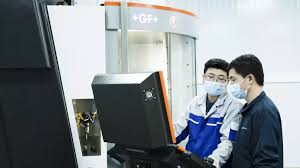Engineering Excellence: CNC Precision Machining for Oil & Energy Applications
In the realm of oil and energy, precision is paramount. From drilling and extraction to refining and distribution, every component must meet exacting standards to ensure operational efficiency, reliability, and safety. At the heart of this precision lies CNC (Computer Numerical Control) precision machining, a sophisticated oil & energy CNC precision machining manufacturing technique that enables the creation of intricate components with unparalleled accuracy. This article delves into the world of engineering excellence, exploring how CNC precision machining drives innovation and advancement in oil and energy applications.
Precision Engineering in the Oil & Energy Sector
Precision engineering plays a pivotal role in the oil and energy sector, where complex machinery and equipment operate in demanding environments. The stringent requirements of this industry necessitate components that can withstand high pressures, extreme temperatures, and corrosive substances. CNC precision machining stands out as a cornerstone of precision engineering, offering the capability to produce intricate parts with tight tolerances and exceptional consistency. By harnessing advanced machining technologies and techniques, engineers can optimize the performance and reliability of equipment used throughout the energy value chain.
Introduction to CNC Precision Machining
CNC precision machining represents the pinnacle of manufacturing technology, combining advanced machinery with computer-controlled automation to achieve precise and repeatable results. Unlike traditional machining methods that rely on manual intervention, CNC machining operates with minimal human involvement, ensuring consistent quality and efficiency. This technique involves the use of computer-aided design (CAD) software to create digital models of components, which are then translated into instructions for CNC machines to follow. The result is the production of highly accurate parts that meet the exact specifications required for oil and energy applications.
Applications of CNC Precision Machining in Oil & Energy
CNC precision machining finds widespread applications across all sectors of the oil and energy industry, from upstream exploration to downstream refining and distribution. In upstream operations, CNC-machined components are utilized in drilling equipment, such as drill bits, casing, and wellheads, where reliability and durability are essential for withstanding harsh drilling conditions. Midstream applications include the machining of pipeline fittings, valves, and compression equipment, ensuring the safe and efficient transportation of crude oil and natural gas. Downstream processes, such as refining and petrochemical production, rely on CNC-machined components for equipment used in distillation, catalysis, and storage.
Advantages of CNC Precision Machining
The adoption of CNC precision machining offers numerous advantages that are particularly beneficial in the oil and energy sector. Firstly, CNC machining provides unmatched precision and consistency, ensuring that components meet the exact specifications required for reliable performance in energy applications. Secondly, CNC machining reduces lead times and production costs compared to traditional machining methods, allowing for faster turnaround and cost-effective manufacturing of high-quality parts. Additionally, CNC machining enables design flexibility, empowering engineers to innovate and optimize component designs for improved performance and efficiency.
Quality Assurance and Compliance
Maintaining stringent quality assurance standards is imperative in CNC precision machining for the oil and energy sector to ensure the reliability and safety of components. CNC machining facilitates quality assurance by providing precise control over machining parameters, ensuring that each component meets the specified requirements for dimensional accuracy, surface finish, and material integrity. Moreover, compliance with industry regulations and standards is ensured through meticulous inspection and documentation processes, guaranteeing the reliability and traceability of CNC-machined components throughout their lifecycle.
Environmental Considerations and Sustainability
As sustainability becomes increasingly important in the oil and energy industry, CNC precision machining plays a vital role in promoting environmentally responsible practices. By optimizing material usage, minimizing waste, and reducing energy consumption, CNC machining contributes to the industry’s efforts to mitigate its environmental impact. Additionally, the longevity and reliability of CNC-machined components extend equipment lifecycles, reducing the need for frequent replacements and conserving resources. Furthermore, CNC machining enables the production of lightweight components with optimized designs, leading to energy savings and reduced emissions during operation.
Technological Advancements and Future Outlook
Technological advancements continue to drive innovations in CNC precision machining, expanding its capabilities and applications in the oil and energy sector. From advanced tooling materials to real-time monitoring systems, manufacturers are leveraging cutting-edge technologies to improve machining efficiency, accuracy, and reliability. Looking ahead, the future of CNC machining in the oil and energy sector holds promise for further advancements, including the integration of AI for predictive maintenance, additive manufacturing for complex geometries, and enhanced automation for lights-out manufacturing. These developments will continue to drive innovation and unlock the full potential of CNC machining in the oil and energy industry.
Conclusion
In conclusion, CNC precision machining stands as a beacon of engineering excellence in the oil and energy sector, enabling the production of high-quality components that meet the exacting demands of energy applications. By harnessing the capabilities of CNC machining technologies, the industry can achieve new levels of efficiency, productivity, and sustainability, driving innovation and progress towards a cleaner and more sustainable energy future. As technological advancements continue to propel CNC machining forward, its role in powering advancements in the oil and energy sector will only become more pronounced, shaping the future of the industry.


